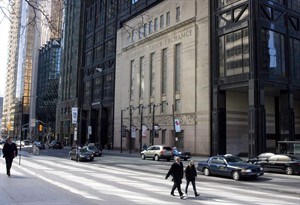
Bay Street in the heart of Toronto's financial district is seen on March 23, 2009. THE CANADIAN PRESS/Chris Young
November 12, 2012 - 5:26 AM
TORONTO - The Toronto stock market looked to start the trading week little changed, with traders unconvinced Republicans and Democrats can reach a compromise to avoid the U.S. falling over the so-called fiscal cliff at the end of the year.
Meanwhile, the retail sector was in focus in the wake of major dealmaking over the weekend.
Leon’s Furniture Limited (TSX: LNF) is offering to buy The Brick Ltd. (TSX: BRK) in a deal the company values at $700 million. The offer is subject to approval by Brick shareholders and will need court and regulatory approval. Leon's will pay $5.40 per share in either cash or debentures. The closing price on Brick shares on the TSX on Friday was $3.50.
Leon's says the two chains would continue to operate as separate entities.
Investors will also look to Research In Motion (TSX:RIM) after the company announced it will officially launch its long-awaited new BlackBerry 10 operating system on Jan. 30 simultaneously in several countries. Besides marking the official launch of BlackBerry 10, the company will also unveil the first two BlackBerry 10 smartphones.
The Canadian dollar rose 0.24 of a cent to 100.11 cents US.
U.S. futures were positive with the Dow Jones industrial futures up 33 points to 12,797, the Nasdaq futures advanced 13 points to 2,593.5, while the S&P 500 futures were ahead 5.1 points at 1,380.8.
The fiscal cliff label refers to a string of tax increases and steep spending cuts aimed at reducing the U.S. deficit and are set to automatically kick in at the first of the year.
But if they are allowed to take full effect, the cuts and tax increases will total at least half a trillion dollars and take a big chunk out of GDP in 2013. Failure to come up with a compromise would likely tip the U.S. back into recession and drag down other economies with it.
"Leaders of both political parties in the U.S. have pledged to co-operate in order to move toward a resolution of the fiscal cliff," said a commentary from Barclays Research.
"However, diametrically opposed view on taxes mean negotiations maybe turbulent."
Both Toronto and New York markets racked up sharp losses last week despite comments from the Obama administration and congressional leaders of a willingness to compromise.
The TSX fell 1.48 per cent while the Dow industrials fell 2.12 per cent, the Nasdaq backed off 2.6 per cent and the S&P 500 dropped 2.4 per cent.
Commodity prices were mixed with December crude on the New York Mercantile Exchange down 13 cents to US$85.94 a barrel.
Copper prices advanced amid positive news from China, the world’s second-biggest economy and the biggest consumer of the metal, which is viewed as an economic bellwether.
The December contract in New York rose two cents to US$3.47 a pound.
China’s industrial output rose 9.6 per cent in October, higher than the expected 9.4 per cent gain that economist expected and up from 9.2 per cent in September. And retail sales were up 14.5 per cent for the month from a year earlier.
December gold gained $5.80 to US$1,736.70 an ounce.
Traders also eyed Greece and its efforts top secure a new bailout loan ahead of a bond repayment on Friday that it cannot afford.
The head the of group of finance ministers from the 17 euro countries, Jean-Claude Juncker, said one issue remained unresolved — how much time Greece will be given to reduce its debts to a manageable level.
Juncker said eurozone finance ministers meeting Monday evening in Brussels would discuss whether Greece should be given extra time to cut its debt to 120 per cent of its GDP beyond the original deadline of 2020.
European bourses were mixed with London's FTSE 100 index up 0.33 per cent and the Frankfurt's DAX up 0.3 per cent while the Paris CAC 40 declined 0.2 per cent.
Earlier in Asia, Japan’s Nikkei 225 index fell 0.9 per cent as growth figures showed the economy contracted at an annualized 3.5 per cent rate for the quarter ended in September. Most economists forecast a further decline in economic activity for the October-December quarter, which would officially put the world’s No. 3 economy in recession.
South Korea’s Kospi fell 0.2 per cent, Australia’s S&P/ASX 200 lost 0.3 per cent, Hong Kong’s Hang Seng added 0.2 per cent, the Shanghai Composite Index gained 0.5 per cent and the smaller Shenzhen Composite Index added 0.5 per cent.
News from © The Canadian Press, 2012